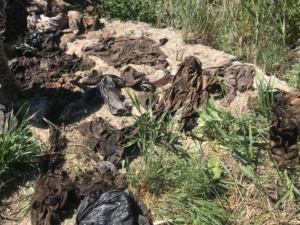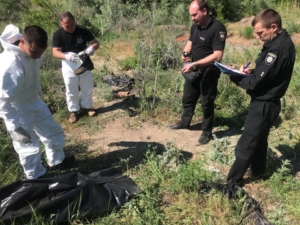Police have started an internal investigation after volunteers found personal belongings of soldiers killed in the Battle of Ilovaisk buried at a fish farm near the city of Dnipro, the National Police reported on its website on May 16.
Volunteers from Black Tulip, an organization that tracks down the remains of missing soldiers, found the plastic sacks with crucifixes, belts, holsters, boots, blood-stained uniforms, radios, and even children’s paintings, buried and forgotten since the autumn of 2014.
The Battle for Ilovaisk in August 2014 was the bloodiest episode in Russia’s war against Ukraine, during which officially 366 soldiers were killed just in one day — Aug. 29, when they were shelled by the Russian troops while leaving encirclement in the city of Ilovaisk.
Mykola Kolesnyk, a deputy of Kryvy Rih City Council of Dnipropetrovsk Oblast and an activist for the volunteer Kryvbas Battalion, which fought in Ilovaisk, told the Kyiv Post the owners of the fish farm in Taromske district of Dnipro city told him about the soldiers’ belongings, which had been packed in 36 bags and had been sent from a morgue.
They said the chief of the local police department had brought the bags to the fish farm in 2014, asking that they be kept there “to dry for a bit.”
But the police never returned to the site and ignored requests to take the bags away, despite the fact that stray dogs and homeless people were occasionally removing some of the belonging of the soldiers that were kept there.

Pieces of military uniform, which were found on May 15 during the excavations at a fish farm by Dnipro city. This uniform belonged to dozens of soldiers killed in August 2014 near Ilovaisk. (Facebook of Mykola Kolesnyk)
After hearing about the case, Kolesnyk asked the volunteers of the Black Tulip to help him check the site.
“Just after we started digging, we found a metal Kryvbas battalion badge, and two pairs of military boots,” Kolesnyk said, adding that May 15, the day the items were found, is also the anniversary of the official formation of the Kryvbas battalion.
Digging some more, the volunteers smelled a strong smell from the bloodstained military uniforms, and called the police.
Police officers finished the excavation and started an investigation.
Mykhailo Kuratchenko, the deputy head of police department of Dnipropetrovsk Oblast, said that back in 2014 two trucks with the bodies of 98 unidentified soldiers found near Ilovaisk had been brought to a morgue in Dnipro city.
The police managed to identify 26 of the bodies, and handed over the belongings of those soldiers to their relatives.
But they couldn’t figure out what to do with the belongings of the unidentified soldiers.
“Given an absence of a proper place to store the belongings, it was decided to take the rest of the belongings to premises offered by the workers of the fish farm, which were ventilated and where it was possible to dry them,” Kuratchenko said, according to a video posted on the National Police website.
Kuratchenko didn’t explain why the belongings of the soldiers ended up being buried on the territory of the farm.
“We started an internal investigation… to check on why those belongings weren’t handed over to the relatives,” he added.

The police officers check on May 15 the personal belongings of soldiers killed in the Battle of Ilovaisk that were found at a fish farm near the city of Dnipro. (Facebook of Mykola Kolesnyk)
However, it will be hard to hold anyone to account for negligence in this case, as the Taromsky department of the police was closed in recent years, according to Kolesnyk, and its former head doesn’t work for the police anymore.
According to volunteers, about 150 bodies of soldiers killed at Ilovaisk remain unidentified. Some soldiers who fought there are also missing.
The case has outraged many Ilovaisk veterans, soldier’s relatives and volunteers who were helping the army at that period.
“It is the mother who should decide to put (the belongings) to a coffin, or to burn them, or to bury them. And all the arguments about the number of those killed, and about embarrassment and confusion, are very weak for me,” Pavlo Netesov, a volunteer who was helping search for the bodies of dead soldiers, wrote on his Facebook page.
